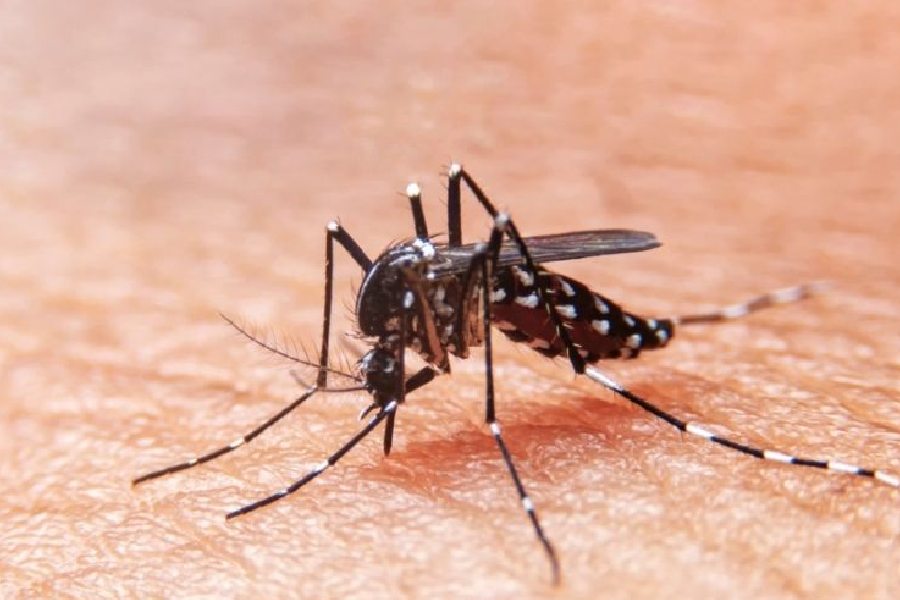States battling a dengue outbreak are regularly updating figures available in the public domain on the number of infections and deaths so informed decisions could be taken while framing policies and chalking out grassroots action to contain the spread of the disease.
But Bengal, in the grip of one of the deadliest outbreaks of the mosquito-borne disease, has chosen to walk a different path and keep all relevant figures under wraps. The state health department fears releasing the data would trigger “unnecessary” panic.
Kerala, which has recorded the highest number of cases nationally this year, and Karnataka, which comes second, are among the states that have opted for data transparency in regard to dengue.
The website of the National Center for Vector Borne Diseases Control (NCVBDC), which functions under the Union ministry of health and family welfare, has data on the number of dengue cases and deaths in the country till September 17.
All states have updated their numbers on the website, but in the space allotted for Bengal one can only find “NR” (not reported).
“Bengal is the only state that is not providing data. The data for 2022 was provided in 2023,” said an official of the Union health ministry.
In 2022, according to the NCVBDC, Bengal had recorded 67,271 cases, the highest in the country for the year.
This year, too, most hospitals in Calcutta are filled with dengue patients and several deaths have been reported from the city and surrounding areas.
Metro reported this week how people suffering from fever are getting panicked and flooding hospitals.
This newspaper spoke to health officials in Karnataka, Kerala and Bengal to find out why they feel — or don’t feel — making dengue data public was important.
Karnataka
Between January and September 17, Karnataka has reported 9,185 dengue cases and no deaths, according to the NCVBDC website.
“Publishing data about dengue in the public domain helps. Because of data transparency, we know the exact number of cases and what actions needs to be taken and when,” said Mahmood Shariff, state programme officer, National Vector-borne Disease Control Programme, Karnataka.
Public health experts have said it is difficult to completely prevent the breeding of Aedes aegypti mosquitoes, the primary transmitters of the dengue virus.
But the spread of the disease can be controlled through public health measures.
“People cooperate only when we give them the real picture. So data transparency is very important. If we tell MLAs that there are many cases in their constituencies, they will come forward for awareness activities and tell people to keep their households clean,” Shariff said over the phone from Bangalore.
“Once dengue cases go out of control, it is very difficult to manage. That happened in the past.”
In Karnataka, 70 per cent of the dengue cases have been reported from areas under the Bruhat Bengaluru Mahanagar Palika (BBMP), Shariff said.
“Through published data, the high-risk areas in Bangalore have been identified. There were deficiencies on the part of the BBMP, but now they are taking action,” he said.
Like Calcutta, Bangalore has its problems. “Many people don’t allow access to their homes for cleanliness drives. Also, there are people who store water because of shortage and water is found to be accumulating in flower pots and vessels,” Shariff said.
Kerala
Data transparency helps political leaders and the people get involved in dengue management, said a senior health official in Kerala.
“We are identifying hotspots. Releasing data in the public domain helps. Persons who are interested can volunteer and inform the government about vector-control activities in their areas. If they see the number of cases is very high in their areas and enough vector-control activities are not being undertaken, they can alert the authorities,” Kerala’s director of health services, Reena K.J., told Metro on Thursday.
People are informing their local administrative bodies about such deficiencies, said Reena.
In 2017, Kerala had developed a system of deploying community volunteers. Five members from every 100 houses were selected and named health volunteers. They were trained in destroying the sources of mosquito breeding.
“Some of the volunteers are still very active,” said Reena.
The official said the number of confirmed cases and deaths are published on the state health department’s website.
“The second part of the data update is about the places of high prevalence of dengue fever, which changes every day,” said Reena.
Kerala had recently invited an expert team of NCVBDC from Delhi. “They visited several areas, trained doctors and nurses and also recommended several measures,” said Reena.
Bengal
A senior health officialsaid they have the data internally.
“Publishing data can cause unnecessary panic. The dengue situation is under control,” said the official. “We have increased testing facilities and also have clear guidelines for treatment,” hesaid.
According to the official, awareness drives are taking place based on the internal data.
Data transparency and engaging volunteers had helped Bengal tackle Covid. Hotspots or potential hotspots were identified and measures were taken accordingly to contain the spread of the coronavirus. Independent health experts said the state government seems to have unlearnt Covid lessons.
